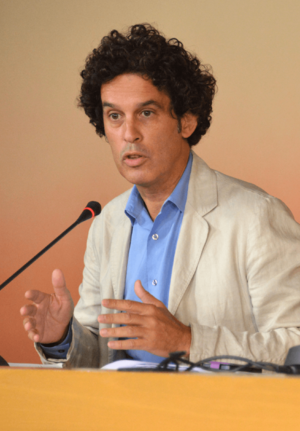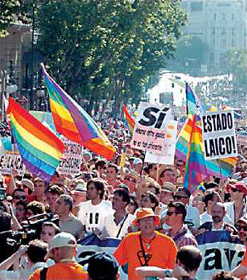Same-sex marriage in Spain facts for kids
Same-sex marriage has been legal in Spain since July 3, 2005. This means that couples of the same gender can get married, just like different-gender couples. In 2004, a new government in Spain, led by Prime Minister José Luis Rodríguez Zapatero, wanted to make this change. They also wanted to allow same-sex couples to adopt children.
After many discussions, a law allowing same-sex marriage was passed by the Spanish Parliament (called the Cortes Generales) on June 30, 2005. The law became official on July 2 and started working the very next day. This made Spain the third country in the world to allow same-sex marriage everywhere in the country, after the Netherlands and Belgium.
Some groups, especially the Roman Catholic Church, did not agree with the new law. They felt it changed the meaning of marriage. However, most people in Spain (about 66%) supported the idea. After the law was approved, a political party called the People's Party asked the Constitutional Court to review it.
About 4,500 same-sex couples got married in Spain in the first year after the law passed. Soon, people wondered if a Spanish citizen could marry someone from a country where same-sex marriage was not allowed. The Justice Ministry said that a Spanish citizen could marry a non-Spaniard, even if the non-Spaniard's home country did not recognize the marriage. At least one person in the couple must be a Spanish citizen or have legal residency in Spain to marry there.
In 2011, the People's Party won the election. Their leader, Mariano Rajoy, had said he was against same-sex marriage. But he waited for the Constitutional Court's decision. On November 6, 2012, the court decided to keep the law, with 8 judges supporting it and 3 against. The Justice Minister said the government would follow this decision, and the law would not be changed.

Marriage Statistics
The Spanish National Statistics Institute (INE) keeps track of marriages. By the end of 2021, more than 62,000 same-sex marriages had taken place in Spain.
Here is a table showing the number of same-sex marriages each year:
| Year | Same-sex marriages | Total marriages | % same-sex | ||
|---|---|---|---|---|---|
| Male | Female | Total | |||
| 2005 (since July) | 914 | 355 | 1,269 | 119,459 | 1.06 |
| 2006 | 3,000 | 1,313 | 4,313 | 207,766 | 2.08 |
| 2007 | 2,141 | 1,052 | 3,193 | 204,772 | 1.56 |
| 2008 | 2,051 | 1,143 | 3,149 | 197,216 | 1.62 |
| 2009 | 1,984 | 1,098 | 3,082 | 177,144 | 1.74 |
| 2010 | 1,955 | 1,238 | 3,193 | 170,440 | 1.87 |
| 2011 | 2,073 | 1,467 | 3,540 | 163,338 | 2.17 |
| 2012 | 1,935 | 1,520 | 3,455 | 168,556 | 2.05 |
| 2013 | 1,648 | 1,423 | 3,071 | 156,446 | 1.96 |
| 2014 | 1,679 | 1,596 | 3,275 | 162,554 | 2.01 |
| 2015 | 1,925 | 1,813 | 3,738 | 168,910 | 2.21 |
| 2016 | 2,188 | 2,132 | 4,320 | 175,343 | 2.46 |
| 2017 | 2,323 | 2,314 | 4,637 | 173,626 | 2.67 |
| 2018 | 2,358 | 2,512 | 4,870 | 167,613 | 2.91 |
| 2019 | 2,492 | 2,649 | 5,141 | 166,530 | 3.08 |
| 2020 | 1,475 | 1,637 | 3,112 | 90,416 | 3.44 |
| 2021 | 2,158 | 2,877 | 5,035 | 147,823 | 3.41 |
In 2020, the number of marriages was lower because of the COVID-19 pandemic and the rules put in place to stop it.
Important Weddings
Even before 2005, there were some notable same-sex unions in Spain's history. In 1061, two men, Pedro Díaz and Muño Vandilaz, had a ceremony in a small chapel. In 1901, Marcela Gracia Ibeas and Elisa Sanchez Loriga had a wedding where Elisa pretended to be a man.
Since the law passed in 2005, many people from different parts of Spanish society have married. For example, Pedro Zerolo, an important politician, married Jesús Santos in October 2005. Famous TV presenter Jesús Vázquez married Roberto Cortés in November of the same year.
In 2006, two soldiers, Alberto Linero Marchena and Alberto Sánchez Fernández, became the first military personnel to marry under the new law. In 2015, Javier Maroto, the mayor of Vitoria-Gasteiz, married his partner Josema Rodríguez. Even the Prime Minister, Mariano Rajoy, who had disagreed with the law before, attended the wedding celebration.
Public Opinion
Many polls have shown that most people in Spain support same-sex marriage.
- In April 2005, a poll found that 66% of Spaniards supported legalizing same-sex marriage.
- A poll in 2007 showed that 60% of Spain's population supported same-sex marriage. This support was highest among younger people (15-34 years old), those with more education, and people who were not religious.
- In May 2013, an Ipsos poll found that 76% of people were in favor of same-sex marriage.
- The 2015 Eurobarometer survey found that 84% of Spaniards thought same-sex marriage should be allowed across Europe.
- A 2017 Pew Research Center poll showed that 77% of Spaniards supported same-sex marriage. This included 90% of non-religious people and 59% of Christians who attended church.
- The 2019 Eurobarometer found that 86% of Spaniards thought same-sex marriage should be allowed throughout Europe.
- A 2023 Pew Research Center poll showed that 87% of Spaniards supported same-sex marriage. Support was highest among people who identified with left-wing politics (94%).
See also
 In Spanish: Matrimonio entre personas del mismo sexo en España para niños
In Spanish: Matrimonio entre personas del mismo sexo en España para niños
- First same-sex marriage in Spain
- LGBT rights by country
- LGBT rights in Spain
- Recognition of same-sex unions in Europe
 | Selma Burke |
 | Pauline Powell Burns |
 | Frederick J. Brown |
 | Robert Blackburn |


